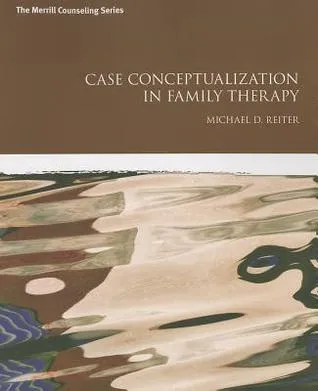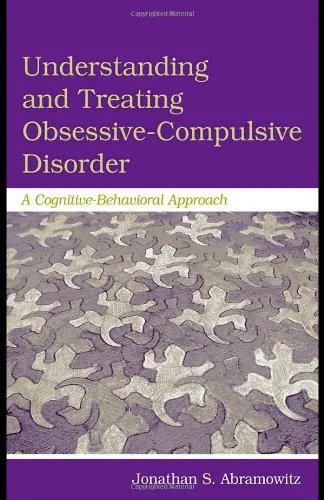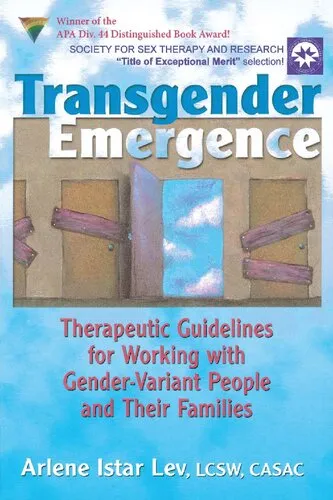Case Conceptualization in Family Therapy
4.6
بر اساس نظر کاربران

شما میتونید سوالاتتون در باره کتاب رو از هوش مصنوعیش بعد از ورود بپرسید
هر دانلود یا پرسش از هوش مصنوعی 2 امتیاز لازم دارد، برای بدست آوردن امتیاز رایگان، به صفحه ی راهنمای امتیازات سر بزنید و یک سری کار ارزشمند انجام بدینکتاب های مرتبط:
معرفی کتاب «Case Conceptualization in Family Therapy»
کتاب «Case Conceptualization in Family Therapy» اثری جامع و کاربردی است که تحت نویسندگی من، مایکل د. رایتر، به جامعه متخصصان، دانشجویان و علاقهمندان به حوزه خانوادهدرمانی ارائه شده است. این کتاب به طور اختصاصی بر مفهوم Case Conceptualization تمرکز داشته و به شما ابزارها و تکنیکهای لازم برای تحلیل و طراحی درمان در بافت پیچیده خانوادهها را آموزش میدهد.
خلاصهای از کتاب
این کتاب با هدف تجهیز درمانگران خانواده به روشهای اصولی و ساختاریافته برای مفهومپردازی دقیق پروندههای درمانی نوشته شده است. «Case Conceptualization in Family Therapy» فرآیند بررسی عمیق تعاملات، الگوهای ارتباطی، و پویایی خانواده را بررسی کرده و در عین حال از اصول نظریهمحور مانند Systems Theory و Narrative Therapy بهره میبرد.
کتاب در چندین بخش طراحی شده است که هر بخش به یکی از جنبههای کلیدی مفهومپردازی درمانی میپردازد. از ارزیابی اولیه و تحلیل مشکلات تا طراحی مداخلات مبتنی بر شواهد، تمامی مراحل با مثالهای واقعی و مطالعات موردی توضیح داده شده تا خوانندگان شناخت عملی از فرآیند کار به دست آورند.
یکی از ویژگیهای برجسته این کتاب، ترکیب نظریه و عمل در فضای خانوادهدرمانی است. درمانگرانی که این کتاب را مطالعه کنند، به ابزارهایی مجهز خواهند شد که آنها را قادر میسازد چالشهای فردی و خانوادگی را بهصورت سازگار و علمی مدیریت کنند.
نکات کلیدی
- توضیح کامل مفهوم Case Conceptualization و اهمیت آن در خانوادهدرمانی
- استفاده از نظریههای مختلف مانند Bowen Family Systems Theory در تحلیل مشکلات
- پیشنهاد ابزارها و مدلهای عملی برای طراحی مداخلات
- تمرکز بر مطالعات موردی و مثالهای واقعی برای افزایش دانش عملی
- راهنمایی دقیق برای تحلیل چندبعدی مشکلات و اهداف درمانی
جملات معروف از کتاب
"Case Conceptualization is not just about understanding the client, but about connecting them to their broader familial and systemic realities."
"Family therapy relies on the delicate balance of addressing both individual and collective narratives within the family unit."
چرا این کتاب اهمیت دارد؟
در دنیای پیچیده امروز، مسائلی که خانوادهها با آنها روبهرو هستند بسیار چالشبرانگیز است. درمانگران نیاز به ابزارهایی دارند که نهتنها درک عمیقی از مشکلات را فراهم کنند، بلکه راهحلهای کاربردی برای پاسخ به این مشکلات ارائه دهند. کتاب «Case Conceptualization in Family Therapy» با ارائه رویکردی چندبعدی، قدمی مهم در ارتقاء مهارتهای بالینی و تحلیلی درمانگران برداشته است.
این کتاب به شما کمک میکند تا نگاه سیستماتیک و تحلیلمحوری به مشکلات داشته باشید. همچنین، با تلفیق دانش نظری و کاربرد عملی، موجب میشود که درمانگران بتوانند روابط خانوادگی را بهبود بخشند و تغییراتی پایدار در زندگی مراجعان خود ایجاد کنند. از این رو، این کتاب نه تنها برای متخصصان حوزه بهداشت روان، بلکه برای دانشجویان و محققانی که در حوزه مطالعات خانواده فعالیت میکنند، منبعی بسیار ارزشمند به شمار میآید.
Introduction to "Case Conceptualization in Family Therapy"
"Case Conceptualization in Family Therapy" is a comprehensive guide that focuses on the foundational process of understanding and analyzing family dynamics through a systematic and well-structured lens. Written by Michael D. Reiter, this book serves as an invaluable resource for therapists, students, and educators in the field of family therapy. By emphasizing theoretical frameworks, practical applications, and actionable strategies, this book presents a clear roadmap for creating thoughtful and impactful interventions to promote healing and growth within families.
Family therapy often demands a nuanced understanding of relational intricacies, systemic patterns, and the influence of sociocultural factors. This book demystifies these complexities by introducing effective tools for case conceptualization. With an emphasis on clarity, structure, and flexibility, it is designed to support family therapists in crafting tailored interventions that meet the unique needs of each family system. Through engaging discussions, real-world examples, and guided exercises, readers are equipped to bridge theoretical models with practical, impactful solutions.
Detailed Summary of the Book
Throughout its chapters, "Case Conceptualization in Family Therapy" takes readers on a journey to hone their clinical skills, moving from foundational principles to advanced case analysis techniques. It provides a step-by-step framework for understanding family dynamics through various contemporary therapeutic models, ensuring a structured approach to case conceptualization.
The book covers a range of topics, including an overview of major family therapy models such as Structural Family Therapy, Bowenian Family Therapy, Solution-Focused Brief Therapy, and Narrative Therapy. It delves into how to connect theory to practice, assess family systems, identify therapeutic goals, and design interventions that align with family dynamics and cultural considerations.
A key feature of the book is its emphasis on reflexivity and cultural competence. The author encourages readers to consider their own perspectives and biases when approaching family therapy. By integrating exercises and reflection prompts, the book ensures that therapists not only build technical skills but also develop self-awareness to enhance their therapeutic relationships.
Key Takeaways
- A comprehensive framework for constructing case conceptualizations rooted in theory and practice.
- Practical tools and techniques for analyzing systemic patterns within families.
- Insights into major family therapy models and their application in diverse contexts.
- Guidelines for developing culturally sensitive and inclusive therapeutic strategies.
- A reflective approach that highlights the importance of therapist self-awareness.
Famous Quotes From the Book
"At its core, case conceptualization is an artful blend of uncovering patterns, understanding relationships, and crafting interventions that align with the lived experiences of a family."
"Therapists must navigate the delicate balance of grounding their work in theory while remaining flexible enough to honor the unique narratives of each family."
"Every family system tells a story, and our role as therapists is to create space for reinterpretation and transformation."
Why This Book Matters
The importance of "Case Conceptualization in Family Therapy" cannot be overstated, as it fills a critical gap in the intersection of theory and practice. By providing a structured approach to conceptualizing family cases, the book empowers therapists to work confidently and effectively in a domain that is often complex and emotionally charged.
Its focus on cultural sensitivity ensures that therapeutic interventions resonate with diverse family backgrounds, making it an essential resource in today’s multicultural world. The reflective exercises and practical tools included in the book enable therapists to refine their understanding of systemic family therapy while remaining adaptive to the evolving needs of their clients.
Whether you are a seasoned therapist seeking to deepen your skills or a student embarking on a career in family therapy, this book offers profound insights and practical strategies that can transform how you approach clinical cases. The emphasis on pairing theory with actionable practice ensures that the content is both intellectually stimulating and immediately applicable in real-world settings.
دانلود رایگان مستقیم
شما میتونید سوالاتتون در باره کتاب رو از هوش مصنوعیش بعد از ورود بپرسید
دسترسی به کتابها از طریق پلتفرمهای قانونی و کتابخانههای عمومی نه تنها از حقوق نویسندگان و ناشران حمایت میکند، بلکه به پایداری فرهنگ کتابخوانی نیز کمک میرساند. پیش از دانلود، لحظهای به بررسی این گزینهها فکر کنید.
این کتاب رو در پلتفرم های دیگه ببینید
WorldCat به شما کمک میکنه تا کتاب ها رو در کتابخانه های سراسر دنیا پیدا کنید
امتیازها، نظرات تخصصی و صحبت ها درباره کتاب را در Goodreads ببینید
کتابهای کمیاب یا دست دوم را در AbeBooks پیدا کنید و بخرید
1413
بازدید4.6
امتیاز0
نظر98%
رضایتنظرات:
4.6
بر اساس 0 نظر کاربران
Questions & Answers
Ask questions about this book or help others by answering
No questions yet. Be the first to ask!















